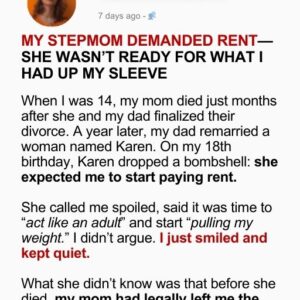She smiled so big her cheeks might have cracked. Little fingers—still baby-round at the knuckles—curled carefully around her baby sister like she had practiced a hundred times in dreams. The yellow hospital blanket clashed wildly with her bright red suspenders, but she didn’t care.
From my bed, I watched through a haze of exhaustion and stitches, my body still trembling with postpartum hormones. For four years, Lina had been our only child. Night after night, she had kissed my swollen belly goodnight, asking in the morning, “Is she here yet?”
Now she was. Elsie. Finally.
I thought—maybe—we were all okay.
But then Lina leaned close to her sister’s soft newborn face, almost brushing noses. In a near-whisper only I caught, she said something that made my heart skip.
“Now,” Lina said softly, “I have someone to keep the secrets with.”
I blinked. “Secrets?”
She nodded, still beaming, eyes like polished brown glass in the hospital light. “Like the ones I don’t tell Dad.”
Before I could ask more, she glanced up, smiling as though to reassure me. “It’s okay. She won’t tell either.”
My laugh came out too thin, brittle. “Well, babies can’t talk yet,” I said, trying to be playful. “But what kind of secrets, sweetheart?”
Lina’s answer didn’t come. Instead, she kissed Elsie’s forehead, hopped down from the chair, and asked for a cookie.
It could have been nothing. A silly child’s imagination. Lina had always been fanciful—she had an imaginary dragon named Toffee and believed clouds were God’s pillows.
But the way she said it… it stuck.
That night, I told no one. James was already stretched thin handling Lina and helping me recover. There was no reason to add “odd whispers” to his load.
Elsie came home two days later. Lina slid effortlessly into her big sister role. She fetched diapers, hummed off-key lullabies, even scolded her stuffed giraffe when it squeaked too loud during nap time.
But she never mentioned “secrets” again. Not for a while.
Two months later, rain pattered against the windows on a quiet Tuesday. I sat half-asleep on the couch, nursing Elsie, when I heard Lina’s voice from across the room. She was on the rug with her dollhouse, little figurines in each hand.
“No, we don’t tell Daddy,” she said, voice firm like a teacher giving orders. “That’s the rule.”
I straightened, blinking away fatigue. “What’s that, honey?”
She turned too fast, like I’d caught her sneaking candy. “Nothing. Doll stuff.”
“Hmm,” I said lightly, masking my unease. “Your dolls have a lot of rules.”
“They have to,” she replied simply, then carried them off to her room.
That night, after both girls were asleep, I told James.
“She keeps saying things about not telling you,” I whispered.
James frowned. “Like what?”
“No clue. Just that there are ‘secrets.’ Today she told her dolls they couldn’t tell you either.”
James chuckled softly. “She’s four. Probably hiding cookies or skipping teeth brushing.”
I nodded, smiling faintly, but my chest stayed tight. Something didn’t feel right.
A week later, Lina and Elsie were on a blanket in the backyard. The late afternoon sun painted everything gold. As I watered hydrangeas, I heard Lina’s small voice float toward me.
“Remember,” she whispered to Elsie, “if Daddy asks, we say the monster only comes when he’s not home.”
The watering can slipped from my hands, spilling across the grass.
I walked over, trying to sound casual. “Lina,” I said lightly, “what monster?”
She looked up, startled again, but then pasted on a tiny smile. “Just pretend. It’s for our game.”
“You said it only comes when Daddy’s away,” I pressed gently.
“Yeah,” she said easily. “That’s when we fight it. We’re heroes.”
I sat beside her on the blanket, my heart hammering. “What does this monster look like?”
She shrugged, twirling Elsie’s tiny hand. “Tall. Shadowy. No face. Sometimes it bangs on windows. Sometimes it hides in the kitchen.”
I forced a chuckle. “That’s some imagination.”
“Elsie sees it too,” she added softly, tracing circles on her sister’s belly.
That night, sleep refused to come. James worked two nights a week at the call center—he had for years—but for the first time, I questioned what happened when I wasn’t home.
I began asking Lina gentle questions during the day. “Do you ever hear funny noises at night?” “What do you and Elsie play when Mommy showers?”
Sometimes she’d giggle and say silly things about flying socks or talking lights. Other times she went silent or changed the subject.
I bought a baby monitor with night vision and motion sensors, telling James it was for safety.
Three nights later, I saw it.
It was past 11 p.m. Elsie stirred, so I checked the monitor. The hallway outside our bedroom glowed faintly green.
Lina stood there.
She didn’t knock. Didn’t speak. Just stood outside our door in her little nightgown, watching.
For ten long minutes.
Then, silently, she turned and padded back to her room.
The next morning, I asked over cereal, “Sweetie, did you have a bad dream last night?”
“Nope,” she chirped.
“Did you come to Mommy and Daddy’s door?”
She shook her head. “Stayed in bed.”
I knew what I saw.
That evening, I searched her room. Under her pillow, I found a folded piece of paper.
Crayon scribbles, black and jagged. A tall, faceless figure behind what looked like our kitchen table. Next to it, two small stick figures—one with red suspenders, the other wrapped in yellow.
Beneath it, scrawled letters read: “Don’t let him take her.”
The blood drained from my face.
James turned pale when I showed him. “This is messed up,” he whispered.
“She says it’s a game,” I said. “But she drew this herself.”
“We should get help,” James said quickly. “A child psychologist. Maybe she’s anxious, maybe jealous of the baby.”
We scheduled an appointment for the following week.
We never made it.
Sunday morning started like any other. Pancakes, warm syrup, laughter echoing down the hallway. I saw Lina twirling with her stuffed duck fifteen minutes before everything went quiet.
Too quiet.
We searched every room, every closet, every corner of the yard. The front door was locked. Backyard gate closed.
Panic rose like a tide. We called the police. Officers searched, dogs sniffed, drones scanned.
Four hours later, James opened the garden shed.
There she was.
Sitting on the floor, holding Elsie tight against her chest. Elsie was unharmed.
When James carried them both inside, I collapsed on the grass, sobbing.
Later, when Lina was calm, I sat beside her on her bed.
“Sweetheart,” I said softly, voice shaking, “why did you take Elsie out there? Why hide her?”
Lina’s big brown eyes were deadly serious. “The monster said he was coming,” she whispered. “I had to hide her. He said he’d take her if I didn’t.”
My hands trembled. “Did… did someone come into the house?”
She shook her head. “He doesn’t need doors.”
I didn’t know what to believe.
The psychologist spoke to Lina for two hours. When he came out, his face was somber.
“She’s bright,” he said. “But deeply anxious. Shows signs of trauma.”
James and I stared at him. “Trauma?” James echoed. “From what?”
“Has anyone hurt her?” the therapist asked gently. “Or frightened her? Someone close?”
We both shook our heads, baffled.
“She’s fixated on this ‘monster,’” he explained. “She feels she must protect her sister. That’s an enormous weight for a child.”
That night, neither James nor I slept.
The next morning, I took Lina out for ice cream. We sat in the park, laughter briefly replacing the heaviness. When her cone was nearly gone, I asked carefully, “Sweetheart… this monster… does he look like anyone you know?”
Her little shoulders stiffened. She glanced down at her shoes.
“Is he real?” I asked softly.
After a long pause, she whispered, “He smells like Daddy.”
My breath caught. “What do you mean?”
“He doesn’t look like Dad,” she said slowly. “But sometimes he sounds like him. Like when Dad shouts at the TV… or slams the door.”
I swallowed hard. “Has Daddy… ever scared you?”
She nodded. “Only when you’re not home.”
That night, I confronted James.
He broke down.
During my late pregnancy, he admitted, he’d started drinking. A beer or two turned into more. When I was away or asleep, his temper flared. He yelled at Lina, once grabbed her wrist too hard when she spilled a drink.
“She never told me,” he sobbed. “I thought… I thought she forgot.”
She hadn’t forgotten.
In her little mind, fear had twisted her loving father into a faceless monster she had to fight.
James moved out that night. He entered treatment. So did Lina.
Slowly, painfully, life began to heal.
The whispering stopped. The drawings stopped. Lina began to laugh again.
James worked hard, stayed sober. Six months later, they began supervised Saturday visits.
One night, tucking Lina into bed, she looked up at me, her voice small but steady.
“I don’t need to keep secrets anymore,” she said.
At that moment, my heart shattered… and healed at the same time.
Sometimes the monsters aren’t hiding under the bed.
Sometimes they’re the people we love, lost in their own pain.
People can change. But most of all, children need homes without secrets.





